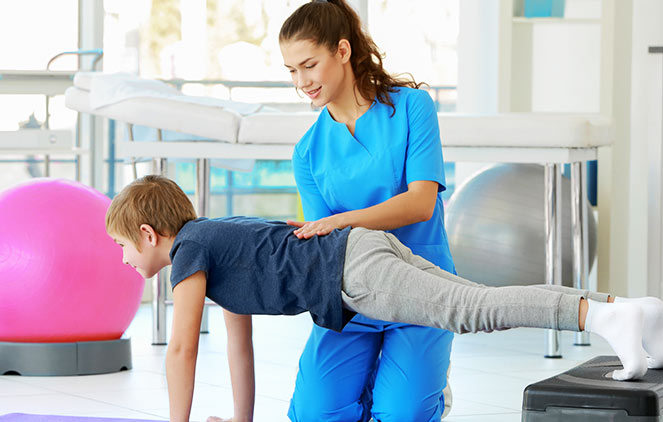Physiotherapy

Welcome to Our Paediatric Physiotherapy Rehabilitation Centre
we are dedicated to enhancing the physical well-being of children through
specialized therapy and care.
Explore our services, learn more about our compassionate team, and discover how we
can help your child thrive. Together, we can build a brighter, healthier future for
your little ones.
WHOM WE CATER MAINLY?
- Children with Cerebral Palsy (CP): This includes various types of CP/Static Disorders affecting motor control and coordination.
- Premature or Low Birth Weight Infants: At risk for developmental delays or neurological issues.
- Children with Developmental Delays: Such as delayed sitting, crawling, walking, or speech.Eg: Neuro regression/Static disorder
- Children with Genetic or Chromosomal Disorders: Conditions like Down syndrome, Rett syndrome, or other genetic abnormalities that impact motor development.
- Autism Spectrum Disorder (ASD): Children with ASD may need physiotherapy and brain-gym technique to address motor coordination and sensory processing issues.
- Attention Deficit Hyperactivity Disorder (ADHD): Brain- Gym technique focus on hyperactivity, attention-concentration deficit and Social integration.
- Neuromuscular Disorders: Such as muscular dystrophy or spinal muscular atrophy etc...
- Brain or Spinal Cord Injuries: Children recovering from traumatic brain injuries, strokes, or spinal injuries.
- Children with Hypotonia or Hypertonia: Abnormal muscle tone affecting motor control and posture.
- Congenital Disorders: Conditions present at birth, such as clubfoot or torticollis that require physical intervention.
- Sports Injuries: Children with sprains, strains, or other injuries resulting from sports or physical activity.
- Children with Orthopaedic Conditions: Such as fractures, scoliosis, and joint problems like hip dysplasia.
- Children with Respiratory Issues: Such as cystic fibrosis or chronic lung conditions, where chest physiotherapy is necessary.
Therapeutic Interventions
- Movement Therapy: Techniques to improve mobility, strength, and coordination.
-
Manual Therapy:
Hands-on techniques to relieve pain and enhance function.
-
Dynamic Movement Intervention:
A therapeutic technique to treat children with
motor delay by improving automatic postural responses and promoting progress
towards developmental milestones.
- Spider cage therapy: A specialised form of paediatric physiotherapy primarily used to help children with neurological and musculoskeletal conditions improve their motor skills, strength, and overall functional abilities.
- Rebound therapy: A therapeutic exercise that uses a trampoline to improve movement, balance and muscle power.
- Brain-Gym therapy: Exercise that stimulates different parts of the brain which helps to control ADHD and ASD features.
- Neurological Rehabilitation: Treatment for conditions such as cerebral palsy, traumatic brain injuries, Muscular dystrophy and developmental coordination disorders etc.
- Musculoskeletal Rehabilitation: Management of injuries, post-surgical rehabilitation, and postural correction
- Relaxation techniques:
-
Orthotic and Adaptive Equipment Services:
Assessment and fitting of orthotics to support physical development.
Recommendations for adaptive equipment to facilitate mobility and independence. -
Education and Support :
Parent and caregiver education on strategies to support their child’s
rehabilitation at home.
Workshops and resources for ongoing support and development. -
Group Therapy Sessions:
Social skills and motor development through group activities.
Peer interaction and encouragement in a supportive environment. -
Collaboration with Other Specialists:
Team approach involving Paediatrician, occupational therapists, Behavioural
therapists, Developmental therapists, Special education teachers and speech
therapists for comprehensive care.
Regular communication to ensure cohesive treatment plans - Contact us today to learn more about how we can support your child's development.

